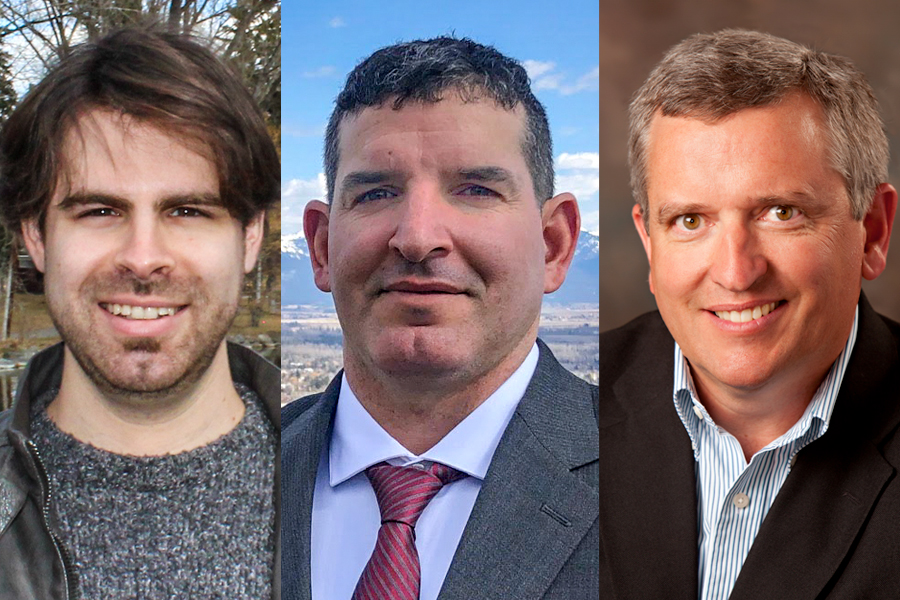Longtime state Rep. Frank Garner is fending off challenges from both sides of the political spectrum as he seeks a return to Helena for a fourth term in House District 7.
Garner, 58, entered politics after a lengthy career in law enforcement, including a stint as Kalispell’s chief of police, and has represented an area centered in downtown Kalispell since first winning office 2014. In the years since, he has made a name in state political circles as a member of the Conservative Solutions Caucus that has frequently worked across the aisle with Democratic lawmakers, often drawing the ire of the more right-leaning wing of the Republican Party. Nicholas Ramlow, who is challenging Garner as a Libertarian in HD7, called Garner “a Republican lawmaker (who) votes Democrat.”
It’s a similar line of attack to one brought by Jerry O’Neil in a primary challenge to Garner this summer, one fended off by the incumbent. But in the general election, Garner will be defending both flanks, with climate activist Ross Frazier also joining the fray with a progressive platform centered around combating climate change and reorganizing the state’s tax code to draw more from the state’s richest earners.
Frazier, 33, started the local chapter of the Climate Reality Project in 2018 and said his passion for the issue comes from a belief “that climate change is going to affect us all in one way or another and it’s going to affect everyone’s children in one way or another.”
“(Kalispell) is a beautiful landscape, and our hunting, our fishing, our skiing and all of these things are going to be affected by climate change,” he said. “This is serious stuff here.”
Frazier ran unopposed in the Democratic primary and proves his progressive bona fides through support of legalizing marijuana, job creation through green energy programs, a rewrite of the tax code that would take a larger chunk from high-income earners and “outside interests,” and strong support of public lands.
“It has been far too long that we’ve been putting up with a Legislature in Helena that does not understand what the real issues facing everyday Montanans are,” Frazier said. “I plan to be a bulwark against that.”
Another political newcomer, Ramlow, 37, carries an ideology that has brought him into alignment with anti-government activist Ammon Bundy in the face of the coronavirus pandemic. Ramlow helped start the Montana chapter of People’s Rights, a Bundy-led group formed in protest to what they see as attacks on personal liberty through issues like a government mask mandate.
Responding to a question about affiliating himself with a controversial figure like Bundy, who was the leader of an armed takeover of Oregon’s Mahleur Wildlife Refuge in 2016, Ramlow said Bundy and his supporters are nonviolent protesters involved in a “neighborly movement” standing up against “institutions all around us that are attempting to rob us through legislation.”
The owner of a concrete construction company, Ramlow says he is running an entirely self-funded campaign and that he wants to give taxpayers “free agency” to opt out of funding programs they disapprove of, saying such a move would be “self-correcting” and force the state to spend money in a way directly dictated by its residents.
Garner, meanwhile, leaned on his experience and past legislative successes to make a case for what would be a fourth and final term. He said the first challenge in Helena next year will be balancing a budget with an anticipated revenue shortfall due to the coronavirus.
“We’ll have to wait until we get revenue estimates before we know exactly what it’s going to look like, but I think this is an important year to not be learning on the job,” Garner said. “We’re going to need experienced lawmakers because we’re going to have to make some hard decisions.”
Garner said his focus would be maintaining revenues and not increasing the financial burden on families impacted by a difficult economic year for many, and pledged to “not burden” small businesses in order to allow them to create local jobs as unemployment rates have risen throughout the state.
Whatever may need to be cut from the budget, Garner said those sacrifices should not come from areas like education — where he said the annual inflationary increase in funding would be one of his first priorities — and health care, noting his past support of legislation that lowered health care premiums and provided access to the working poor.
Garner has won his last three races by a wide margin, including in 2018 when he secured 65% of the vote in defeating Democrat James Cossitt.
